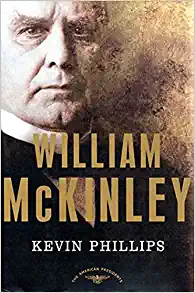William McKinley

“Our faith teaches that there is no safer reliance than upon the God of our fathers who has so singularly favored the American people in every national trial and who will not forsake us so long as we obey His commandments and walk humbly in His footsteps”
-- William McKinley
As a fan of the American Presidents history series, I especially adore the books that cover our lesser covered presidents, and the book on William McKinley is one I enjoyed that told a lot about someone overshadowed by Theodore Roosevelt, who came after him.
Each book in the series tends to have a distinct style, as it's a collaborative series with many different authors covering different Presidents. The book on McKinley, while covering a lot of expected ground concerning the life and accomplishments of the United States' 25th president, also covers a lot of history of the changes he wrought in American politics.
The book has three main things it sets out to do. First, the author felt McKinley has often been given short shrift by other historians, who usually considered him one of the more forgettable Presidents. Second, the text serves to be a rebuttal of many of the claims that caused McKinley to be maligned by other historians. Finally, McKinley was President and before then a prominent member of the Republican party who was instrumental in the 1896 shift in the American electoral college that shaped US history for decades afterward. This last subject is given particular focus as a complement to the other two platforms the book sets out to cover.
In my reading, I came away with some interesting conclusions about McKinley. Many other histories I had read prior tended to marginalize McKinley as a bookend of the Gilded Age and shunted him into the ignoble status of patron of corporate interests to the detriment of the common man. The book goes into exhaustive detail why that is not the slightest bit true, though to its credit is remarkably even-handed in covering his Democratic rivals and why they believed such claims were valid. Another valuable insight this book revealed is that, while McKinley was stereotyped as being genial but not a dynamic force in politics, and instead a party hack, that was false. If anything, he was revealed to be a leading expert on issues of trade, corporate responsibility to their workers, a firm believer in compassionate relief for people both domestic and foreign, and a firm advocate of American interests while not being arrogant during the brief Spanish-American War of 1898.
The book does have a few minor criticisms. The author tends to be wordy, taking a while to get to the next point. There is a lot of adjacent trivia to the life and times of McKinley, that, while informative and instructive, may turn off readers wanting a simple delineation of the facts about his life and career. Finally, while it's an intensely useful narrative regarding relaying actual historical information, the ending chapters engage in a lot of speculation about if McKinley had survived his assassination that had cut his second term short.
This all said, I still enjoyed it, being a historical trivia fan, but I would keep the criticisms in mind before purchasing. If those reservations are acceptable, they may be purchased on Amazon in Kindle, audiobook, and hardcover for a reasonable price.
(Amazon Affiliate Link)
When you subscribe to the blog, we will send you an e-mail when there are new updates on the site so you wouldn't miss them.




Comments